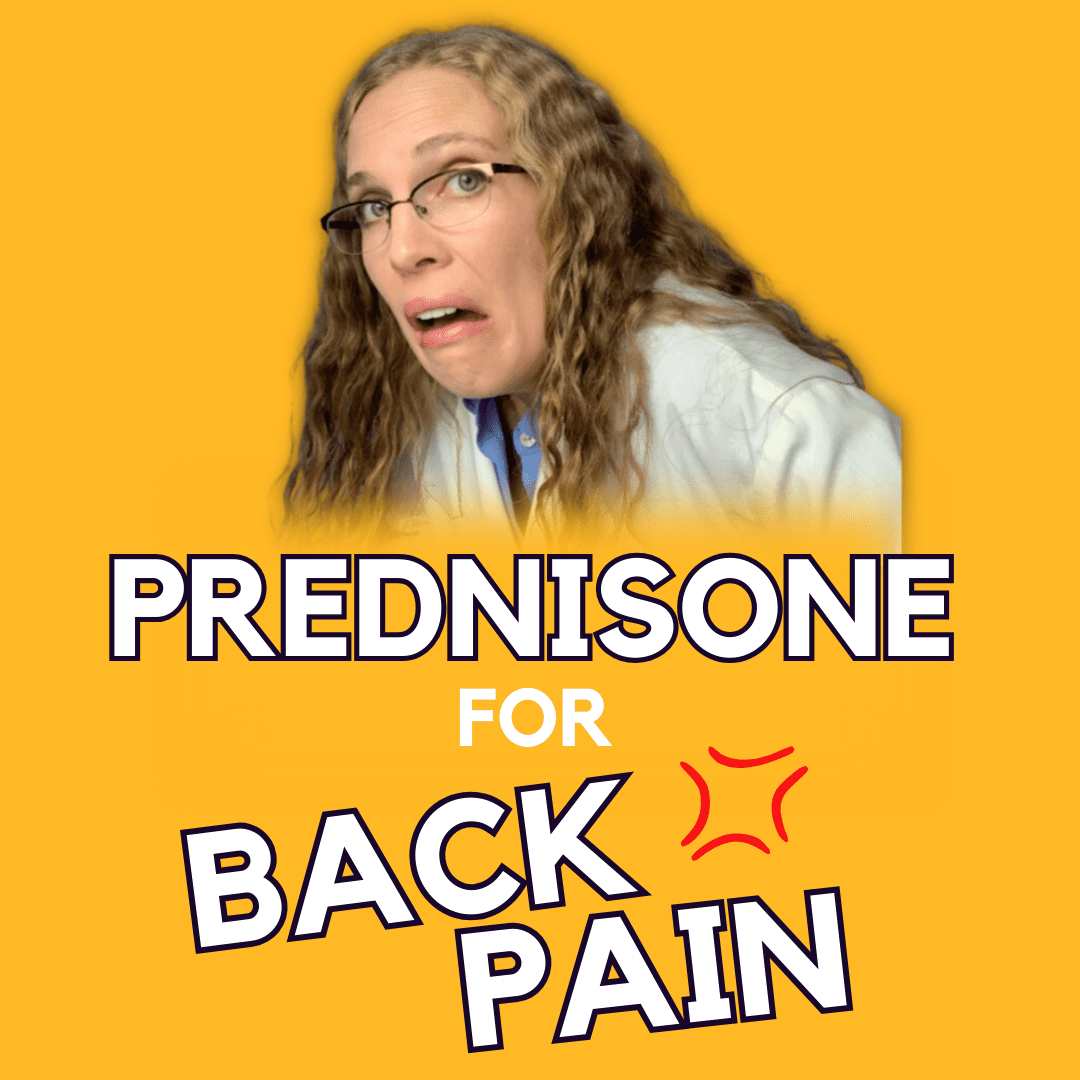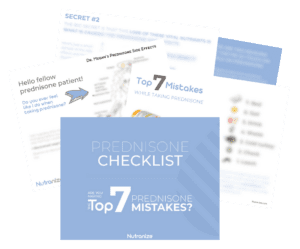Prednisone for Back Pain

Did your doctor prescribe prednisone for low back pain? I’ve had low back pain. I’ve had grandparents with horrible low back pain. So I can completely understand the devastation and desperation that is involved in this debilitating condition. I’d like to give you the real facts so that you can make this decision with your eyes wide open.
Back pain is a common ailment that affects millions of individuals worldwide, leading many to seek effective treatment options. While prednisone is sometimes prescribed for back pain, this blog post aims to shed light on the misconception surrounding its efficacy. We will explore the limitations, potential risks, and alternative solutions for managing back pain without relying on prednisone.
Watch now!
The Limitations of Prednisone
Prednisone, a corticosteroid medication, may offer relief for certain conditions, but its effectiveness in treating back pain is limited. We will delve into the reasons behind this and explain why prednisone may not be the optimal choice for addressing the underlying causes of back pain.
Understanding the Causes of Back Pain
Back pain can stem from various factors, including muscle strain, herniated discs, or degenerative conditions. Prednisone primarily targets inflammation, which may not be the root cause of every individual’s back pain. We will explore alternative pain management strategies that address specific causes, leading to more targeted and long-lasting relief.
Does Prednisone Help Back Pain?
The most important thing to understand is there are lots of different kinds of back pain.
First of all, there’s radicular, or it radiates back pain that radiates down into your legs. And if it’s that kind of back pain, it’s a different answer than if it’s non-radicular or if you have spinal stenosis.
If your pain goes down your legs, that’s radicular. If it’s just on your lower back or if it’s stenosis of your spine, then that’s a different kind.
The Cochrane database did a review of all the literature about back pain, and this is exactly what they said;
“Systemic corticosteroids appear to be slightly effective at improving short-term pain and function in people with radicular low back pain not due to spinal stenosis, and might slightly improve long-term function. The effects of systemic corticosteroids in people with non-radicular low back pain are unclear and systemic corticosteroids are probably ineffective for spinal stenosis.”
Potential Risks and Side Effects
Prednisone, like any medication, carries potential risks and side effects. Prolonged use may result in weight gain, mood changes, osteoporosis, and an increased risk of infections. By avoiding or minimizing the use of prednisone, individuals can reduce their exposure to these adverse effects.
Another doctor who did a review of literature about prednisone and other corticosteroids about back pain said;
“The widespread use of corticosteroids in patients with non-pneumonia, or low back pain is inappropriate and not worth the risk of rare but potentially serious harms.”
Prednisone Back Pain Dosage
While prednisone is unlikely to be helpful for back pain based on the information above, if you need to know what the prednisone back pain dose could be, I will share a few examples below.
A study published in JAMA used the following prednisone dosage for acute lumbosacral radiculopathy: a tapering 15-day course of oral prednisone (5 days each of 60 mg, 40 mg, and 20 mg) and then stopped.
For acute lumbosacral radiculopathy, the prednisone back pain dosage has been suggested by one back doctor to be:
“A course of oral prednisone (60 to 80 mg daily) for five to seven days. This is followed by a rapid taper to discontinuation over the following 7 to 14 days.”
Alternatives to Prednisone for Back Pain
Effective Non-Medicinal Approaches
Numerous non-medicinal approaches can effectively manage back pain without the need for prednisone. Physical therapy, exercise, strengthening and stretching routines, as well as complementary therapies like chiropractic care or acupuncture, can provide relief by addressing the underlying causes rather than solely targeting inflammation.
Lifestyle Modifications and Preventive Measures
Making positive lifestyle changes, such as maintaining a healthy weight, practicing good posture, adopting ergonomic habits, and incorporating stress-reducing techniques, can significantly prevent or alleviate back pain. These modifications focus on overall well-being and can help individuals reduce their reliance on medication.
Consultation with Healthcare Professionals
Consulting with healthcare professionals, such as physical therapists or pain specialists, is crucial when exploring alternatives to prednisone. They can provide personalized advice, recommend appropriate treatment plans, and guide individuals towards the most effective options for their specific condition.
A Holistic Approach
By combining various non-medicinal approaches and lifestyle modifications, individuals can adopt a holistic approach to managing back pain. This multifaceted strategy aims to improve overall well-being, prevent future pain episodes, and promote long-term relief without relying on prednisone.
There are so many options that are not prednisone that I would recommend before you ever go there. If you have any questions about how to counteract the side effects of prednisone, download my Prednisone checklist.
Conclusion
Although prednisone may have its uses in certain medical scenarios, it is not an effective solution for back pain management in most cases. By understanding the limitations, potential risks, and alternative approaches available, individuals can make informed decisions about their treatment options. Embracing a holistic approach that addresses the root causes of back pain can lead to more sustainable and comprehensive relief, improving overall quality of life.
References
- Chou R, Pinto RZ, Fu R, Lowe RA, Henschke N, McAuley JH, Dana T. Systemic corticosteroids for radicular and non-radicular low back pain. Cochrane Database Syst Rev. 2022 Oct 21;10(10):CD012450. doi: 10.1002/14651858.CD012450.pub2. PMID: 36269125; PMCID: PMC9585990.
- Ebell MH. Short Courses of Oral Corticosteroids: Lack of Benefit and Potential Harms for Common Acute Conditions. Am Fam Physician. 2018 Jul 1;98(1):12-17. PMID: 30215965.
- Wewege MA, Bagg MK, Jones MD, Ferraro MC, Cashin AG, Rizzo RR, Leake HB, Hagstrom AD, Sharma S, McLachlan AJ, Maher CG, Day R, Wand BM, O’Connell NE, Nikolakopolou A, Schabrun S, Gustin SM, McAuley JH. Comparative effectiveness and safety of analgesic medicines for adults with acute non-specific low back pain: systematic review and network meta-analysis. BMJ. 2023 Mar 22;380:e072962. doi: 10.1136/bmj-2022-072962. PMID: 36948512; PMCID: PMC10540836.
- Eskin B, Shih RD, Fiesseler FW, Walsh BW, Allegra JR, Silverman ME, Cochrane DG, Stuhlmiller DF, Hung OL, Troncoso A, Calello DP. Prednisone for emergency department low back pain: a randomized controlled trial. J Emerg Med. 2014 Jul;47(1):65-70. doi: 10.1016/j.jemermed.2014.02.010. Epub 2014 Apr 13. PMID: 24739318.
- Goldberg H, Firtch W, Tyburski M, Pressman A, Ackerson L, Hamilton L, Smith W, Carver R, Maratukulam A, Won LA, Carragee E, Avins AL. Oral steroids for acute radiculopathy due to a herniated lumbar disk: a randomized clinical trial. JAMA. 2015 May 19;313(19):1915-23. doi: 10.1001/jama.2015.4468. PMID: 25988461; PMCID: PMC5875432.
Related Posts
-
What I Wish I Had Before Taking Prednisone: Nutranize Zone
Hey, did you know that you don’t have to suffer and think there’s nothing you... -
9+ Nutrients Depleted by Prednisone
Prednisone steals over nine critical nutrients from the body. This nutrient depletion is responsible for... -
“It’s not you, it’s the drug!”
“It’s not you, it’s the drug!” Those are the words we need to hear, but...

